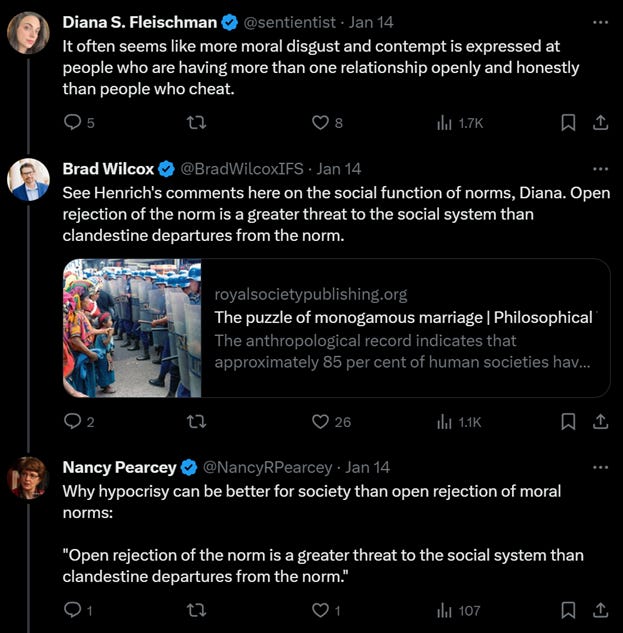Is cheating better than polyamory? - part 1
An article came out in The New York Times about a woman’s experiences being polyamorous. I didn’t read it. If you’re plugged into the many polyamory and consensual non-monogamy groups that exist on the internet, people are sharing their stories of finding and resolving conflict in these relationships all the time. It’s nothing new. This is why whenever I see someone’s personal story about navigating polyamory, I think: “Well, that’s good”. Having multiple partners is tricky and rife with unique challenges, and sharing experiences can help to identify better or worse ways of navigating them.
That’s why I asked Dr. Brad Wilcox, Director of the National Marriage Project at the University of Virginia, on Twitter why he and his following seemed to have a strong moral disgust to the Times publishing this piece. He replied with a thoughtful (if not well worn) response, citing work by Dr. Joseph Henrich showing that monogamy as a social technology has helped humans to address the recurrent group living challenges of non-monogamy. I wrote:
I think monogamy’s great, and where it works, it works well. But it doesn’t work well for everyone, and people who struggle to maintain monogamy have few alternative options.
A common alternative is to cheat. And for those confused about the difference between cheating (or infidelity) and polyamory: cheating is when you break a relationship agreement, such as “you can’t have sex or fall in love with other people”. You’re flouting the premise of a social contract, like using your textbook during a closed-book exam, or committing fraud in a marketplace of fair exchange. Polyamory is a social contract, but it does not have a premise of sexual or romantic exclusivity - though it could have other boundaries that may be transgressed.
Polyamorous people tend to discuss and defend their boundaries to prevent misunderstandings, broken promises, and other causes or amplifiers of potential relationship harm. The idea is: if each person exerts enough autonomy to know, communicate, and stand by their relationship expectations, partners can anticipate and resolve conflict together. Rather than forbid relationships with other people, they try to plan around the risks that other relationships can introduce.
For example, maybe you’re a risk-taker, so you don’t care as much about having safer, protected sex. But maybe one (or several) of your partners is deathly afraid of pregnancy or contracting an infection. If these partners communicate this to you, you now know how to protect them from something that you might not have intuitively considered because it’s not something you worry about.
When people cheat in monogamous relationships, they are far more likely to jump into another relationship impulsively and ignore the security of their partner. So, people who cheat in monogamous relationships appear to be putting themselves and others at greater risk than those who form outside relationships with their partner’s informed consent.
This is why I was surprised when I started seeing:
So, the argument is that letting people cheat is better than polyamory because it preserves the institution of monogamy, and this benefits society even if people aren’t perfectly following its norms. I think. I was a bit confused, but Dan Savage had good thoughts:
He then added:
I can see Dan’s point that cheating can make the best of a bad situation, but I don’t think that this argument is why those who condemn polyamory want to see it cleansed from public knowledge as an option.
I think it should be an option for the same reasons that monogamy should be an option: it is a set of practices that encourages honest, open coordination between partners to resolve the recurrent challenges of having multiple intimate partners.
Monogamy’s solution is: let’s not have other relationships! It’s abstinence. Strictly speaking, abstinence works when no one’s bothered by it. But because people are human and humans are not all built the same, some people will not successfully abstain.
Those who value having multiple intimate relationships - whether sexual, romantic, or some combination thereof - need to be given options for having these relationships without the need to lie or cheat.
Keep praising monogamy. That’s fine. It’s worth praising. But don’t discourage cheaters from finding alternatives to managing multiple relationships that are more above-board and collaborative.
---
This will be the first in a series of posts where I attempt to take the steel man arguments against polyamory – or those that I believe are best positioned to refute what I’ve just said above – and explain why I believe they are insufficient.
Stay tuned.
(Part 2 is here)





